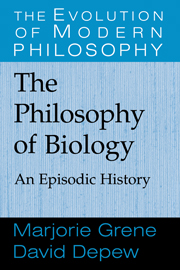Book contents
- Frontmatter
- Contents
- List of Figures
- Notes on Citations and References
- Acknowledgments
- Preface
- 1 Aristotle and After
- 2 Descartes, Harvey, and the Emergence of Modern Mechanism
- 3 The Eighteenth Century I
- 4 The Eighteenth Century II
- 5 Before Darwin I
- 6 Before Darwin II
- 7 Darwin
- 8 Evolution and Heredity from Darwin to the Rise of Genetics
- 9 The Modern Evolutionary Synthesis and Its Discontents
- 10 Some Themes in Recent Philosophy of Biology
- 11 Biology and Human Nature
- 12 The Philosophy of Biology and the Philosophy of Science
- References
- Index
7 - Darwin
Published online by Cambridge University Press: 05 June 2012
- Frontmatter
- Contents
- List of Figures
- Notes on Citations and References
- Acknowledgments
- Preface
- 1 Aristotle and After
- 2 Descartes, Harvey, and the Emergence of Modern Mechanism
- 3 The Eighteenth Century I
- 4 The Eighteenth Century II
- 5 Before Darwin I
- 6 Before Darwin II
- 7 Darwin
- 8 Evolution and Heredity from Darwin to the Rise of Genetics
- 9 The Modern Evolutionary Synthesis and Its Discontents
- 10 Some Themes in Recent Philosophy of Biology
- 11 Biology and Human Nature
- 12 The Philosophy of Biology and the Philosophy of Science
- References
- Index
Summary
Interpreting Darwin
Prior to the twentieth century, no prominent scientist has left so detailed a record of his life and thought as has Charles Darwin. Between notebooks, marginalia, unpublished as well as published works, and a vast correspondence, he has provided an almost endless set of data for scholars to assimilate and interpret. Traditionally, most students of Darwin followed what Hodge has called the “Franciscan” view – that is, a view supported by his life and letters as Darwin's son Francis assembled and published them (Hodge 1985, p. 207), and also by the brief autobiography Darwin himself wrote for the benefit of his family (Darwin 1958). Since then, a great deal of further material has entered the public domain: Darwin's sketch of his theory in 1842 and his essay of 1844, the unfinished draft of his “big book,” Natural Selection, the transmutation notebooks, and a more complete correspondence, carefully annotated, now available through the year 1863 (as of the present writing). Darwin scholars, members of the “Darwin industry,” also delve into other material still tucked away in the Darwin archives of the Cambridge University library. Further, as available material by Darwin continues to increase in volume, so, inevitably, do commentaries on it. In this situation, it is difficult to step backward and consider briefly Darwin's stance and his impact in some of the areas we are concerned with.
- Type
- Chapter
- Information
- The Philosophy of BiologyAn Episodic History, pp. 192 - 220Publisher: Cambridge University PressPrint publication year: 2004

